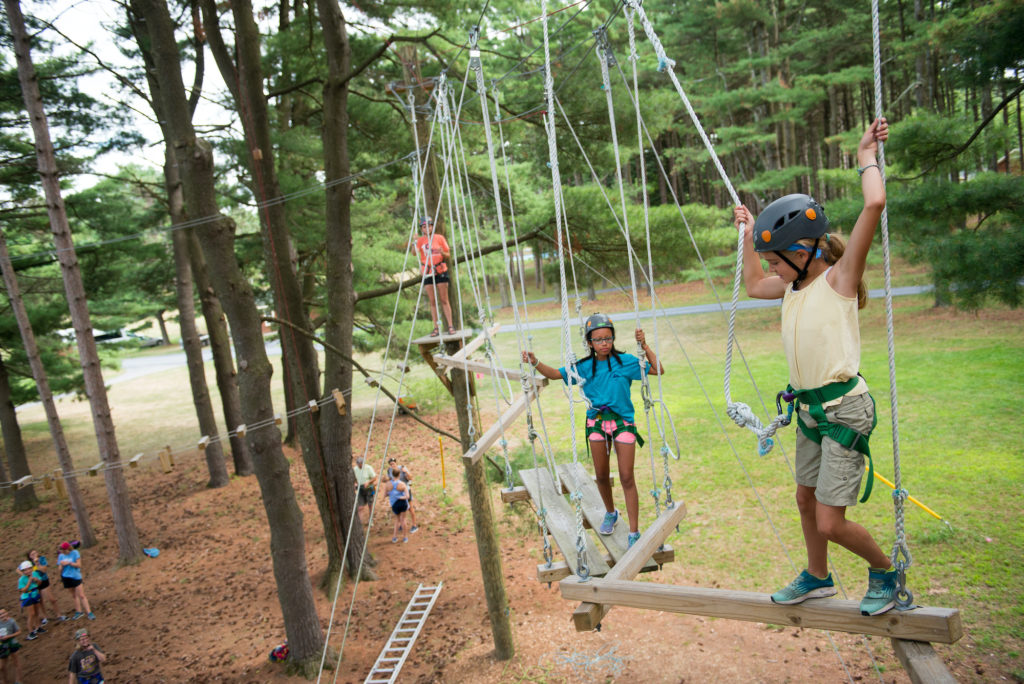‘Neath the Pines
 By #24962 Kate Dobson
By #24962 Kate Dobson
You get there from the Triangle — the shape formed by the three Cub division cabins that divide the green. You walk down a dirt path where your feet kick up dust each time you step. There’s no one way you need to go; gravel roads crisscross the camp’s grounds, so you don’t have to walk through the woods. But sometimes I seek them out. I choose to walk through the pines. You can see through them to the dining hall and the big silver bell that sings a song before breakfast, lunch, and dinner. The trees stand in formation, tall and straight with branches growing in all different directions, like carrots that have hit a rock. I don’t know how many rows there are, I’ll have to count them next time. When I look up at the trees, I feel big — most people would probably feel small, but when I look at them, they lift me up.
We all have that special place, a place as warm and familiar as home, even if it’s far away. Mine is Camp Kiniya, on the shores of Lake Champlain. But my favorite place in Kiniya is “neath the pines.” Ever since my first day of sleepaway camp I’ve always loved the peace of the green forest, and the pines that have been there for 101 — soon to be 102 — years. They were first planted by Kiniya’s founder Helen Van Buren, and have been there ever since. For generations, girls–just like me–have walked under their limbs and branches. I like the thought that the pines have a long history for such a little spot of land and that each time I walk by I add (just a little bit) to that history.
At camp, “neath the pines” is a phrase we use to describe a state of mind, not just the place. It is special to me because it has a sense of unity and connection. The motto of Camp Kiniya is “the other fellow first.” We are taught to think about other people before we think of ourselves. The pines remind me of the people who have come before me. They remind me of the people who have shared this special place, even if I never knew them. When I am there with my counselors, leaders, and fellow cabin mates, it makes me feel like I’m part of a community, something bigger — and yet I feel at home.
Whenever I miss Kiniya, I imagine that I am sitting in this small forest with my friends. In my mind, I see the sun streaming down through the trees, shining down on me as if watching, looking down to greet me. I smell the scent of pines and I see campers sitting in circles, their heads bent down and their bodies hunched over as their fingers quickly tie each knot of their friendship bracelets. I can hear birds as they fly from tree to tree, talking to one another. I hear laughter, chit chat, and the silly banter of summer.

Wherever there are 200 girls, it is never really quiet. Camp Kiniya is no different. In the dining hall, at evening Hymn Sing, and when we compete on the playing fields, it is always loud and rowdy. While that is fun, sometimes at camp I would want to get away and be alone. So I had my own special routine. Every day at 2 o’clock I would gather up my book, my navy blue chair, and a water bottle and head off to the pine trees. When I entered the grove of trees, I would first notice the crisp, clean smell of the pines. Then, I’d search for the perfect place to get lost in a book.
For the next two hours, I would be transported to far away places and distant moments in time. I would read about a young girl who after World War II fled East Germany by tunnelling under the Berlin Wall to be reunited with her family. I’d read about stories of a mad scientist obsessed with discovering the fountain of youth. I’d learn what it was like for a girl born with cerebral palsy and a brilliant mind to get people to understand who she is truly is and what she is capable of achieving. Here in the quiet of the pines I would escape to other times and see through other people’s eyes. When the bell would ring, it would call me back. I would pack up my things and return to camp.
I don’t remember the first time I saw the pines, although it must have been when we took a tour of Camp Kiniya. My family and I were in Vermont, and my Mom and Dad had heard about this girls’ camp up north. I was probably no more than 6 or 7 years old. I imagine when I saw the pines all I saw were trees. They didn’t have any history or meaning to me. I probably didn’t stop to stare at them or give them a second thought. I probably didn’t even know they were pine trees. I certainly didn’t know that this grove of trees would become so special to me.
Now I carry the pines with me wherever I go. I think about them in every season. I think about how in the mountains of Vermont it is snowing right now, and the tree branches are weighed down, bending like Christmas shoppers carrying heavy packages. The grass and clover is tucked under blankets of snow, sleeping for a season. The cabin roofs lined with white. How sad and empty it must be for the camp to have no campers. But maybe not? Maybe the pines know that the campers will come back for another year? Maybe they expect to hear our loud and rowdy voices again? Maybe they are waiting for me? Waiting for next year.
RELATED LINKS
